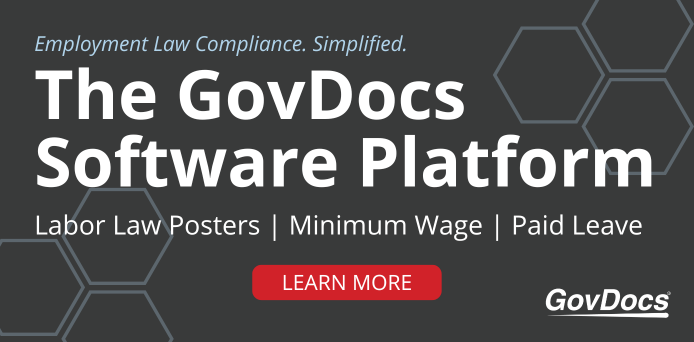EMPLOYMENT LAW NEWS
Coordinating Compliance with Illinois State and Local Paid Sick Leave Laws
By Jana Bjorklund, GovDocs Senior Counsel and
Director, Employment Law and Compliance
Published Feb. 22, 2024

Illinois employers should make sure they are in compliance with the newly effective Illinois’ Paid Leave for All Workers Act (PLAWA).
Illinois made significant changes to paid sick leave laws at the state and local levels in 2023 with some laws taking effect in 2023 and some in 2024. Let’s break down what employers need to know to coordinate compliance with these laws.
Coordination with Local Illinois Paid Sick Leave Laws in 2024
Illinois’ Paid Leave for All Workers Act (PLAWA) went into effect on Jan. 1, 2024 and sets the minimum requirements for paid leave that employers must provide to their employees state-wide. However, PLAWA contains an exemption for counties or municipalities with a local paid leave ordinance in effect prior to the effective date of PLAWA on Jan. 1, 2024.
Two local jurisdictions—Cook County and Chicago—have their own paid leave ordinances that were in place prior to the effective date of the state law and are therefore exempt from PLAWA.
Any local ordinance enacted or amended after the effective date of PLAWA must comply with all PLAWA requirements.
Illinois Paid Leave for All Workers Act
PLAWA applies to all employers in Illinois except for school districts organized under the School Code or park districts organized under the Park District Code. Employers subject to PLAWA must provide covered employees with 40 hours of paid leave per year to be used for any reason. Employees are not required to give their employer a reason for the leave and may not be required to provide documentation or certification in support of the leave. Here are some other key elements of the law.
Accrual Rate and Waiting Period
Employee paid leave must accrue at a rate of 1 hour of paid leave for every 40 hours worked starting Jan. 1, 2024. Employees will be eligible to begin using their accrued paid leave as of March 31, 2024, due to a 90-day waiting period following the effective date of the paid leave law. Employees hired after the effective date of the law will have a 90-day waiting period from their employment start date before they can use their accrued paid leave.
Carryover and Annual Use Cap
Employers may cap employees’ use of paid leave to 40 hours per year. Any accrued but unused paid leave must be carried over annually and there is no limit on the amount of leave carryover balance.
Frontloading
Employers may avoid accrual and carryover tracking and instead frontload paid leave annually by providing the full amount of an employee’s anticipated paid leave accruals on the first day of a specified 12-month period of the employer’s choosing. Under the frontloading method, any remaining paid leave at the end of the specified 12-month period will be forfeited.
Payout at Termination
Paid leave accrued but unused at termination of employment generally doesn’t have to be paid out unless the employer credits the paid leave to an employee’s vacation or paid time off (PTO) account. Under the Illinois Wage Payment and Collection Act, unused, earned paid time off must be paid at termination.
Employers should carefully review their policies and how they track and account for paid leave under PLAWA. To avoid a required payout at termination, employers should track paid leave earned under PLAWA separately from an employee’s vacation or PTO account under an employer’s policy.
Cook County Paid Leave Ordinance
Cook County has had a paid sick leave ordinance since 2017, and Cook County’s Board of Commissioners rewrote their paid leave ordinance at the end of 2023 to align with PLAWA. Cook County’s Paid Leave Ordinance (CC Ordinance) was effective Dec. 31, 2023. Employees will be eligible to use their accrued paid leave on March 30, 2024.
The CC Ordinance does not apply to Chicago employers since Chicago has its own paid leave law. However, the CC Ordinance applies to all other municipalities in the county – even those municipalities that had previously opted out of Cook County’s paid sick leave law. Municipalities must affirmatively opt out of the new CC Ordinance or be subject to the CC Ordinance. Any municipality that opts out of the CC Ordinance will then be subject to PLAWA unless the municipality that opts out passes a paid leave ordinance more generous than PLAWA.
There are two differences in the CC Ordinance from PLAWA. The CC Ordinance allows for a private cause of action with potential recovery of treble damages, interest, and attorney’s fees. The CC Ordinance also allows for benefits to delivery and airline workers, which doesn’t exist under PLAWA.
Chicago Paid Leave and Paid Sick and Safe Leave Ordinance
Chicago has also had a paid sick leave ordinance in effect since 2017. The city amended its ordinance on Nov. 9, 2023 and passed the new Chicago Paid Leave and Paid Sick Leave Ordinance (Chicago’s New Ordinance) which was originally set to take effect on Dec. 31, 2023. However, the start date of Chicago’s New Ordinance has been delayed until July 1, 2024 under an amendment to the law passed on Dec. 13, 2023. Please note that Chicago employers are currently subject to the jurisdiction’s existing paid leave law until the new ordinance goes into effect on July 1.
Chicago’s New Ordinance is quite different than PLAWA as it requires accrual for both paid leave for any reason and paid sick leave to be used for specific medical reasons. Here are a few key provisions of the law.
Accrual Rate and Waiting Period
Under Chicago’s New Ordinance, covered employees must accrue 2 hours of paid leave for every 35 hours worked. The accrual is split between the differing leave types, so 1 hour is applied to the employee’s balance of paid leave for any reason and 1 hour needs to be applied to the employee’s balance for paid sick leave. The maximum accrual for each type of leave is 40 hours per year for a total accrual of 80 hours of leave per year.
Employers should note that the waiting period before an employee can use their accrued leave is different for each type of leave. Employees may use their paid leave for any reason on the 90th day following the start of employment. Employees may use their accrued paid sick leave on the 30th day following the start of employment.
Additionally, any accrued paid sick leave earned by an employee prior to July 1, 2024 must be carried forward to the employee’s balance of paid sick leave under Chicago’s New Ordinance.
Carry Over and Annual Use Cap
Chicago’s New Ordinance allows for carryover of up to 16 hours of accrued but unused paid leave for any reason into the following year. Up to 80 hours of accrued but unused paid sick leave can be carried over to the following year.
Frontloading
Employers may avoid accrual tracking and carryover requirements by frontloading both paid leave for any reason and paid sick leave. Employers who choose this method must grant employees 40 hours of paid leave for any reason and 40 hours of paid sick leave on the first day of employment or the first day of the 12-month accrual period. Employers who opt to frontload are not required to carry over an employee’s unused paid leave hours to the following year.
Payout at Termination
Any accrued but unused paid leave for any reason may need to be paid out at termination depending on the size of the employer.
- Small employers (1-50 employees) are exempt and do not need to pay out unused paid leave.
- Medium employers (51-100 employees) must pay out up to 16 hours of accrued but unused paid leave for any reason at termination until July 1, 2025. After that date, medium employers must pay out up to 56 hours of accrued but unused paid leave for any reason.
- Large employers (101+ employees) must pay out up to 56 hours of accrued but unused paid leave for any reason at termination.
Employers are not required to pay out accrued but unused paid sick leave to employees at termination.
Additional Guidance for All Three Illinois Paid Leave Laws
The proposed rules for paid leave under PLAWA, the CC Ordinance, and Chicago’s New Ordinance, which will provide additional guidance for employers, have all been drafted. None have been finalized although are all expected to be finalized soon.
In addition, Illinois and Chicago have frequently asked questions (FAQs) on their department websites which provide additional context and guidance regarding these laws. Cook County also has FAQs on their website, as well as a very helpful comparison chart outlining a few aspects of the three paid leave laws.
Conclusion
Illinois employers should make sure their paid leave policies align with the requirements for employees under IL PLAWA or any applicable local ordinance depending on where their employees perform their job duties.
If you would like a helping hand, GovDocs’ Paid Leave helps employers navigate increasingly complex paid leave laws at the federal, state, county, and city levels to ensure compliance.
This Employment Law News blog is intended for market awareness only, it is not to be used for legal advice or counsel.
Keep Informed
with GovDocs Employment Law News
What is GovDocs?
GovDocs simplifies employment law compliance for large, multi-jurisdiction employers in the U.S. and Canada. The GovDocs software platform integrates three solutions in one convenient place to help you master the employment laws impacting your business. Whether you manage labor law postings, minimum wage or paid leave program, our products cut through research time, provide proactive insights into the everchanging landscape of employment laws and reduce the risk of noncompliance. The company is headquartered in Eagan, Minn.
The GovDocs Poster Store simplifies posting compliance for employers with less than 30 locations across all industries, offering a variety of posting products to meet your labor law compliance needs.





